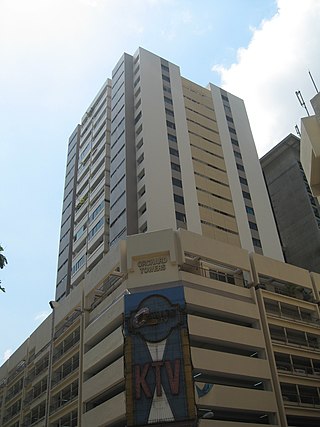
Caning is a widely used form of corporal punishment in Singapore. It can be divided into several contexts: judicial, prison, reformatory, military, school and domestic. These practices of caning as punishment were introduced during the period of British colonial rule in Singapore. Similar forms of corporal punishment are also used in some other former British colonies, including two of Singapore's neighbouring countries, Malaysia and Brunei.

Capital punishment in Singapore is a legal penalty. Executions in Singapore are carried out by long drop hanging, and they usually take place at dawn. Thirty-three offences—including murder, drug trafficking, terrorism, use of firearms and kidnapping—warrant the death penalty under Singapore law.
Tay Yong Kwang is a Singaporean judge of the Supreme Court. He was first appointed Judicial Commissioner in 1997, appointed Judge in 2003, and appointed Judge of Appeal in 2016. He was noted for being the presiding judge in several notable cases that shocked the nation and made headlines in Singapore.
Choo Han Teck is a Singaporean judge of the Supreme Court. He was formerly a lawyer before his appointment to the court as a judge. It was revealed in 2021 that Choo was one of the defence lawyers representing Adrian Lim, the infamous Toa Payoh child killer who was executed in 1988 for charges of murdering a girl and boy as ritual sacrifices. In 1994, Choo also defended Phua Soy Boon, a jobless Singaporean who was hanged in 1995 for killing a moneylender.

The Arms Offences Act 1973 is a statute of the Parliament of Singapore that criminalizes the illegal possession of arms and ammunition and the carrying, trafficking, and usage of arms. The law is designed specifically to make acts of ownership, knowingly receiving payment in connection with the trade of a trafficked armaments and ammunition, as well as the unlawful usage of arms and ammunition a criminal offence.

Josephus Tan Joon Liang, better known as Josephus Tan, is a Singaporean criminal defense lawyer known for his pro bono work. In 2015, Tan received the Singapore Youth Award.
Eugene Singarajah Thuraisingam is a lawyer from Singapore. He is the founder of the law firm Eugene Thuraisingam LLP, a law firm that specialises in international arbitration and criminal and commercial litigation. He is also known for his advocacy of human rights and for his opposition of the death penalty in Singapore. In relation to his domestic practice as a criminal lawyer in Singapore, Thuraisingam has defended many alleged suspects in high profile criminal trials, including those who were dissidents and critics of the government of Singapore. For his legal service for many defendants in the court of Singapore, Doyles Guide has named him as a leading criminal defence lawyer in Singapore in 2020.
On the early morning of 31 May 2001, 17-year-old national footballer Sulaiman bin Hashim, along with his two friends were attacked by a group of eight youths from gang 369, known as Salakau, as they were walking along South Bridge Road, Clarke Quay, Singapore. Sulaiman was grievously assaulted by the gang while his two friends managed to escape. During the assault, Sulaiman sustained 13 stab wounds and two of them were fatal; he died as a result. The case was classified as murder and within the next 13 months, six of the gang members involved were arrested and eventually sentenced to jail and caning for culpable homicide, rioting and voluntarily causing grievous hurt. However, till today, the remaining two assailants were never caught.

The 2010 Kallang slashing was a series of four robberies committed by a group of four Malaysians from Sarawak, Malaysia in the night of 29 May 2010 and the early hours of the morning of 30 May 2010, mostly around Kallang Area, Singapore. In the robberies, there were a total of four victims – the first three victims were seriously injured and hospitalised while a fourth victim was killed.
On 30 October 2010, 19-year-old Darren Ng Wei Jie, a Singaporean student from Republic Polytechnic, was slashed by 12 youths from a rival gang after a staring incident between one of Ng's friends and one of these youths attacking him. Ng suffered from 28 knife wounds and died in Changi General Hospital five hours after the incident. The case was classified as murder, and the police arrested all the suspects. Six of them were charged with murder, but all except one were sentenced to serve lengthy jail terms with caning for culpable homicide, while the others were sentenced to varied jail terms and caning for rioting.

On 23 October 2016, a five-year-old boy was pronounced dead at a children's hospital in Singapore. He was found to have been a victim of child abuse by his parents Azlin binte Arujunah and Ridzuan bin Mega Abdul Rahman for months leading up to his death. This involved both Azlin and Ridzuan using boiling hot water to scald the boy on several occasions, inflicting severe burns and scald injuries which caused the boy to die in hospital weeks after the first of the four scalding incidents. The couple was later arrested and charged with murder. To protect his surviving siblings' identities and their privacy, the boy was not named in the media.

The Orchard Towers double murders was the case of two deaths occurring at Balmoral Park, Singapore, before the victims' bodies were discovered at a carpark in Orchard Towers, thus the title of the case. The victims were 46-year-old Kho Nai Guan and Kho's 29-year-old Chinese girlfriend Lan Ya Ming, and they were both murdered by Kho's British employer Michael McCrea. McCrea was assisted by his girlfriend Audrey Ong Pei Ling in disposing of the bodies before they both fled Singapore to Australia, where they were caught.

The 2019 Orchard Towers murder was a murder case where a group of men killed 31-year-old Satheesh Noel Gobidass, who sustained several knife wounds and died at Orchard Towers on 2 July 2019. The murder was not the first case that involved the Orchard Towers. In 2002, the case of British expatriate Michael McCrea killing his friend and another person before disposing of the bodies at Orchard Towers was another that associated the Orchard Towers with murder. In the end, McCrea was sentenced by the courts to serve 24 years in prison after he pleaded guilty to culpable homicide not amounting to murder.

Annie Ee Yu Lian was a Singaporean waitress who was cruelly abused for eight months before she died on 13 April 2015 at the age of 26. Ee's abusers were her 31-year-old childhood friend Tan Hui Zhen and Tan's 38-year-old husband Pua Hak Chuan, who were both her flatmates in the couple's four-room Woodlands flat. The physical abuse lasted for eight months from August 2014 to the date of Ee's death. The cause of death was certified to be acute fat embolism as a result of the beatings Ee received from Tan and Pua. It was also revealed that Annie Ee had an intellectual disability, which was one of the factors behind the public outcry against the couple.
On 10 May 2020, 38-year-old assistant manager Tay Rui Hao was attacked by another person while he was jogging in the night along Punggol Field. Tay, who sustained multiple stab wounds, was able to call the ambulance, but he died at Sengkang General Hospital after reaching there. The police investigations led to the arrest of 20-year-old Surajsrikan Diwakar Mani Tripathi. Surajsrikan was charged with murder a week after killing Tay, and the motive of his crime was supposedly due to the negative emotions he harboured over his father abandoning his family 21 years before on the same date he killed Tay.

Life imprisonment is a legal penalty in Singapore. This sentence is applicable for more than forty offences under Singapore law, such as culpable homicide not amounting to murder, attempted murder, kidnapping by ransom, criminal breach of trust by a public servant, voluntarily causing grievous hurt with dangerous weapons, and trafficking of firearms, in addition to caning or a fine for certain offences that warrant life imprisonment.

Vincent Lee Chuan Leong is a Singaporean ex-convict who, together with two illegal immigrants from China, kidnapped a 14-year-old female student in 1999. The trio abducted the teenager into their rented car, and then demanded S$500,000 ransom from the girl's father, a wealthy second-hand car dealer. Eventually, through negotiations, the ransom was lowered to S$330,000, and upon the agreement to the amount, the ransom was paid and the girl was subsequently released without harm.

On 25 November 2016, at Tanah Merah Ferry Terminal, Singapore, during a heated argument, Ahmad Muin bin Yaacob, a 23-year-old Malaysian cleaner, killed his 54-year-old supervisor Maimunah binte Awang by stabbing her with a pair of grass cutters and bludgeoning her on the head repeatedly. He stole Maimunah's jewellery and abandoned her body in a drain before he fled back to his hometown in Pasir Puteh, Kelantan, Malaysia. He pawned some of the jewellery for money to afford his wedding expenses. Ahmad was arrested by the Royal Malaysia Police a month later on 18 December 2016, merely nine days after his marriage. Ahmad was extradited back to Singapore the next day to be charged with intentional murder. On 4 November 2020, Ahmad was found guilty of a lesser charge of murder in his trial and he was sentenced to the minimum sentence of life imprisonment and eighteen strokes of the cane, after the prosecution agreed to not argue for the death penalty in his case.











